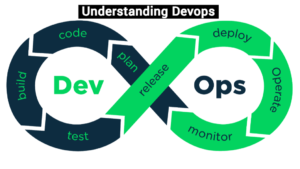
Understanding DevOps represents a software development methodology that underscores the significance of collaboration and communication between development and operations teams. Its primary aim is to elevate the swiftness and excellence of software delivery by automating processes and shattering the barriers that often exist between these teams.
Incorporating Agile Principles
DevOps finds its roots in Agile software development principles, which lay emphasis on iterative development, continuous delivery, and continuous customer feedback. DevOps teams employ a diverse array of tools and technologies to streamline the software development lifecycle. These tools encompass version control systems, continuous integration and deployment (CI/CD) tools, as well as monitoring and logging solutions.
The Advantages of DevOps
DevOps bestows numerous advantages upon organizations willing to embrace it. Some of these advantages include:
1. Accelerated Time-to-Market: DevOps expedites the software development lifecycle, reducing the time it takes to develop, test, and deploy software.
2. Enhanced Quality: By automating processes and integrating CI/CD tools, DevOps detects and rectifies errors at an early stage of development, ensuring a higher software quality.
3. Promotes Collaboration: DevOps prioritizes collaboration and communication between development and operations teams, mitigating conflicts and enhancing overall teamwork.
4. Enhanced Efficiency: Through process automation and technologies like infrastructure as code, DevOps drives efficiency by minimizing manual labor and errors.
5. Cost Savings: Leveraging cloud-based infrastructure and automation tools, DevOps helps organizations save on hardware, software, and personnel expenditures.
Understanding DevOps: Practical Steps
If you aspire to embark on a journey into the world of DevOps, here are some pragmatic steps to follow:
1. Grasp the Fundamentals: Start by gaining a comprehensive understanding of DevOps, encompassing its core principles, practices, and tools. An abundance of online resources, including blogs, videos, and tutorials, are readily available to initiate your learning process.
2. Select the Right Toolchain: DevOps mandates the use of a varied toolchain to automate the software development process. Choose a toolchain that aligns with your specific requirements and become proficient in its utilization.
3. Hands-On Experience: The most effective method of learning DevOps is through practical application. Seek opportunities to engage in real-world projects that incorporate DevOps practices and tools.
4. Community Involvement: Becoming part of the DevOps community offers a valuable opportunity to learn from peers and stay updated on the latest trends and best practices. Online forums, social media groups, and local meetups are excellent platforms to connect with like-minded individuals.
5. Certification: Consider pursuing DevOps certification to validate your knowledge and skills. Renowned certification programs are offered by industry giants like AWS, Microsoft, and Google.

Key DevOps Tools
DevOps leverages a plethora of tools and technologies. Some of the prominent ones include:
1. Jenkins: An open-source automation server, Jenkins streamlines various aspects of the software development process, such as building, testing, and deploying applications.
2. Git: As a distributed version control system, Git facilitates source code management, allowing developers to collaborate on code concurrently while tracking modifications.
3. Docker: Docker, a containerization platform, empowers developers to package applications and their dependencies into lightweight, portable containers, simplifying application deployment.
4. Kubernetes: This open-source container orchestration platform automates the management of containerized applications, making deployment and scaling more efficient.
5. Ansible: An open-source automation tool, Ansible automates tasks ranging from configuration management to application deployment.
Balancing the Scales: DevOps Pros and Cons
DevOps brings several benefits to the table, but it’s essential to acknowledge its drawbacks as well:
Advantages:
1. Faster Time-to-Market: DevOps expedites software delivery, reducing development, testing, and deployment timelines.
2. Improved Quality: Automation and CI/CD tools enhance software quality by detecting and rectifying errors early in the development cycle.
3. Enhanced Collaboration: Emphasizing teamwork and communication between development and operations teams, DevOps fosters a harmonious work environment.
4. Greater Efficiency: Process automation and infrastructure as code lead to increased efficiency by minimizing manual tasks and errors.
5. Cost Savings: Through the adoption of cloud-based infrastructure and automation tools, organizations can trim expenditures on hardware, software, and personnel.
Disadvantages:
1. Complexity: The myriad tools and technologies involved in DevOps can introduce complexity in implementation and management.
2. Resistance to Change: Achieving a DevOps culture within organizations can be challenging, as it requires a significant cultural shift. Some employees may resist change or lack the necessary skills to thrive in a DevOps environment.
3. Security Risks: Automation and cloud-based infrastructure can introduce new security risks that necessitate careful management.
4. Dependency on Third-Party Tools: DevOps heavily relies on third-party tools and services, introducing risks if these tools aren’t effectively managed.
5. Lack of Standardization: The vast array of tools and technologies in the DevOps landscape can lead to a lack of standardization, making tool selection a complex task for organizations.
Thriving in DevOps Careers
DevOps is a burgeoning field, offering numerous career opportunities for individuals with the right competencies and experience. Common roles in DevOps include:
1. DevOps Engineer: Responsible for designing, implementing, and maintaining the infrastructure and tools essential for supporting the software development process.
2. Site Reliability Engineer (SRE): Ensures software systems are reliable, scalable, and efficient, handling tasks such as system monitoring, incident response, and process automation.
3. Automation Engineer: Designs and implements automated tests and processes to guarantee software product quality.
4. Cloud Architect: Designs and implements cloud-based solutions that align with an organization’s requirements
5. Security Engineer: Focuses on securing software systems and protecting them from cyber threats.
6. Release Manager: Manages the release of software products into production environments, coordinating with development teams and ensuring successful releases.
7. Technical Evangelist: Promotes a company’s products or services to technical audiences through various means, including creating technical content and engaging with developer communities.
Summary: To embark on a DevOps career, establish a strong foundation in software development principles. Gain experience with essential tools like Git, Jenkins, Docker, Kubernetes, and AWS, and consider pursuing DevOps certification to showcase your expertise
